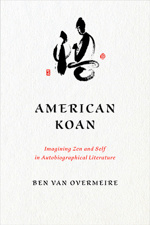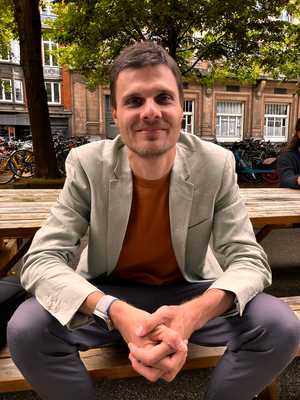Today, we are happy to bring you our conversation with Ben Van Overmeire, author of American Koan: Imagining Zen and Self in Autobiographical Literature
What inspired you to write this book?
Since my twenties, I’ve been fascinated by Zen Buddhism and its literature. Most studies on Zen, though, only talk about the classic Zen tradition in East-Asia. But there’s this whole vibrant Zen literature today, in America, that almost no one was writing about. So I wrote a book about that tradition.
What did you learn and what are you hoping readers will learn from your book?
When I discovered Zen, I was struck by how many of its classical texts rejected the written word as a means of understanding and insight. But despite this rhetoric, literature and the imagination more broadly are really important for Zen practitioners. There’s all these Zen masters that claim to have become enlightened while listening to a sacred Buddhist text or while reading a book. That resonates with me because I believe books can transform our lives.
What surprised you the most in the process of writing your book?
Usually, the type of memoir literature that I focus on in the book is not highly regarded, let alone that it is studied as “Buddhist Literature.” Yet in thinking about these books, I found that they had a lot to say about how I was living my life. It’s not just classic, canonized texts that contain wisdom, wisdom is everywhere.
What’s your favorite anecdote from your book?
It’s from Ruth Ozeki’s a Tale for the Time Being. Accompanied by her great-granddaughter, an elderly Zen nun called Jiko goes to a department store in Japan, and a group of young delinquents starts shouting abuse and threatening them. But Jiko just stops and bows at them. Surprisingly, the teenagers then return Jiko’s bow. “Wow,” you think, “she’s so Zen.” But afterwards, it becomes clear that Jiko, because she’s nearly blind, thought she was at a religious festival meeting beautifully dressed girls in kimono. It’s funny, but it also shows that our approach to any situation can deeply determine and transform that situation, turn something ugly into something beautiful. Dogen, a classic Japanese Zen master, talks a lot about this, about how things can be very different depending on who you are and where you’re standing. For example, here in China I love going out running when it’s pouring rain. I’m from Belgium where it never stops raining, and I find it refreshing. But for some of my students running is torture, and they hate rain. Neither me or my students are correct. Rain is rain. Running is running. But our responses to the rain or the run can vary immensely. Nothing is what it seems. I find that perspective on things liberating.
What’s next?
I’ve started a project on Buddhism in outer space. Since I was a kid, I’ve been a fan of science fiction, particularly spectacular space opera books. Many of these books have Buddhist elements, and Buddhism was a major influence on such sci-fi pioneers like 2001: A Space Odyssey’s Arthur C. Clarke and Dune’s Frank Herbert. It’s interesting, because to me Buddhism, especially its East-Asian Mahayana branch to which Zen belongs, is the one world religion that seems the best fit for space exploration: it is centered around emptiness, it freely admits that multiple worlds and non-human intelligent species exist, and many of its adherents have claimed that it’s totally compatible with quantum and astrophysics. I want to know more about that stuff.





